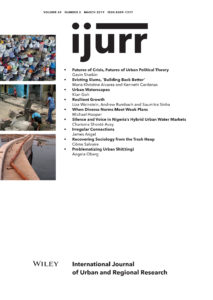This article highlights how the governance of the water sector affects the strategies and tactics urban residents use to gain improved access to water for household consumption in cities with limited networked infrastructure. A framework of exit, voice and loyalty (EVL) is used to characterize the actions household decision makers take in neighborhoods across metropolitan areas. In Nigeria, Lagos and Benin City are rapidly growing metropolitan regions with urban water markets competing with a state‐run utility. Scholars have documented informality and hybridity between state and non‐state actors, but there is less understanding of variables associated with citizen behavior in urban water markets across different types of households and communities. This article places Nigeria in the context of African mobilization around water provision, using interviews, observation and findings from fieldwork, household interviews and surveys undertaken between 2008 and 2015 to show how access to water is shaped by the interplay between state and non‐state sources of water. This access is filtered through differently regulated service providers and the perceived authority of each actor involved in water delivery, which can lead to what I call structural silence. Findings show the need for a grounded understanding of factors influencing voice and participation in local governance.
Details
Written by:
Charisma Shonté Acey
Digital Object Identifier (DOI)
10.1111/1468-2427.12715
About DOI

